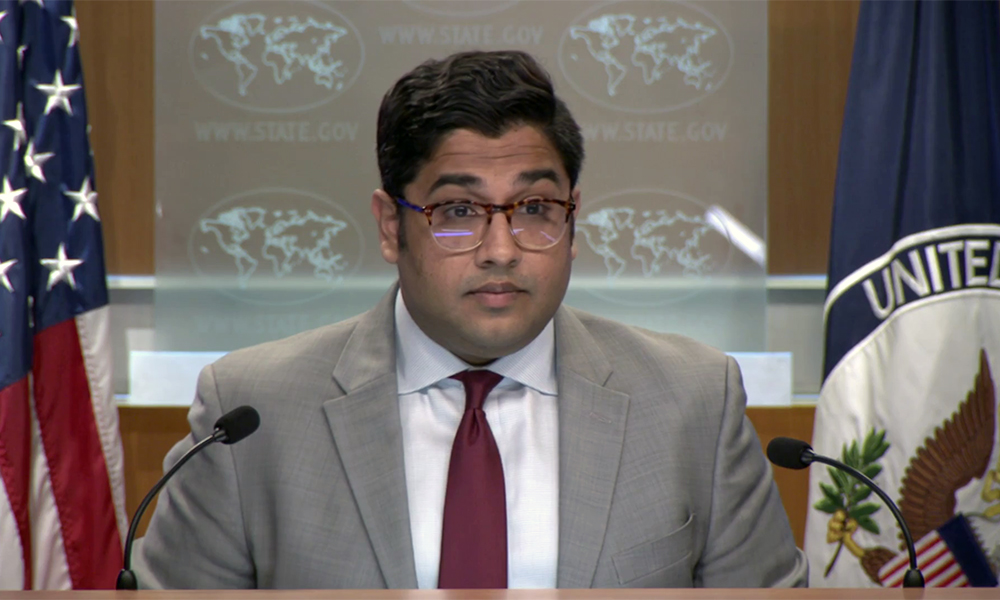Latest News
US: IEA’s treatment of Afghan women a major concern for Washington

The US State Department’s deputy spokesperson, Vedant Patel, said Monday that the actions of the Islamic Emirate against women are becoming a big concern for Washington.
“Let me say a couple of things. First and foremost, as it relates to Afghanistan and the Taliban (Islamic Emirate of Afghanistan), its treatment of women and girls, its lack of human rights, basic human rights in everyday society, continues to be something of great concern to us and something that we have continued to make clear to the Taliban is unacceptable to us as it goes about its own desired journey for legitimacy,” said Patel.
He said America has implemented measures to prevent the IEA from accessing humanitarian aid.
But the Islamic Emirate accuses the US of abusing the term – women’s rights in Afghanistan – and says that the US uses this issue as a tool of pressure.
This comes after UNAMA said in a report Monday that the Islamic Emirate has arrested a significant number of women and girls, mainly from the Hazara region of Dasht-e-Barchi and some in Khair Khana, for not observing the hijab in accordance with Sharia.
The IEA in turn responded by slamming the report, and stating UNAMA was insulting the beliefs of the nation.
Patel told reporters that the United States has tried to prevent humanitarian aid and American taxpayers’ money from reaching the Islamic Emirate.
He said: “There are a number of steps and measures that are in place to ensure that U.S. humanitarian aid does not end up in the hands of the Taliban (Islamic Emirate).”
He added: “We work closely with trusted NGOs and other entities who we’ve had long-established relationships with, and there are measures and vetting and other processes in place to ensure that the hard-earned money from the American taxpayer does not end up in the hands of the Taliban.”
The United Nations has also said that the money donated by the world to this organization is in its accounts and the Islamic Emirate does not have access to it.
Latest News
Continued aid to Afghanistan vital for regional security: Kazakh president

Kazakhstan’s President Kassym-Jomart Tokayev has emphasized the continuation of humanitarian assistance to Afghanistan, stating that the ongoing provision of such aid plays an important role in ensuring regional security.
Speaking at the international conference “Peace and Trust” in Ashgabat, the capital of Turkmenistan, Tokayev described addressing complex humanitarian challenges and the reconstruction of Afghanistan as a necessity.
“To ensure regional security, we consider it essential to continue providing assistance to Afghanistan, including by strengthening international efforts to address complex humanitarian issues and the reconstruction of this country. Kazakhstan remains committed to supporting the people of Afghanistan through humanitarian aid, educational projects, trade development, and food security initiatives,” he said.
Meanwhile, experts believe that sustainable improvement of the humanitarian situation in Afghanistan requires broad cooperation from the international community and support for the country’s economic development.
“Investment can be defined as one of the fundamental drivers of the economic cycle, and whenever Afghan traders do not take their money out of the country and instead invest domestically, it naturally leads to greater growth and dynamism in Afghanistan’s economy,” said Abdul Zahoor Modabber, an economic analyst.
As the humanitarian crisis in Afghanistan continues, reports by international relief organizations indicate that millions of citizens of the country are in urgent need of food, health, and livelihood assistance.
The reduction in funding for aid organizations, the impacts of climate change, and the return of migrants have increased concerns about a further deterioration of the humanitarian situation in the country.
Latest News
Islamic Emirate declines to attend Tehran meeting on Afghanistan
Latest News
Sirajuddin Haqqani: A government that intimidates its people is not a true government

Khalifa Sirajuddin Haqqani, Minister of Interior of the Islamic Emirate of Afghanistan, said during a visit to Khost province on Friday that any government which rules through fear cannot be considered a true government.
“A government is one that is loved by its people, one that serves them with respect and compassion, and from whose behavior people learn ethics and sincerity,” he said.
Haqqani also stressed that Afghans who opposed the Islamic Emirate in the past should be tolerated and treated in a way that helps eliminate hostility and animosity, paving the way for national cohesion.
-

 Latest News2 days ago
Latest News2 days agoMuttaqi: Afghanistan’s progress requires both religious and modern education
-

 Sport4 days ago
Sport4 days agoILT20: Desert Vipers edge Gulf Giants in historic super over thriller
-

 Regional4 days ago
Regional4 days agoSix Pakistani soldiers killed in TTP attack in Kurram District
-

 Business4 days ago
Business4 days agoTrade bodies warn almost 11,000 Afghan transit containers stuck at Karachi port
-

 World4 days ago
World4 days agoPowerful 7.6 earthquake hits northern Japan, tsunami warnings issued
-

 Latest News3 days ago
Latest News3 days agoTrump calls Afghanistan a ‘hellhole’ country as US expands immigration restrictions
-

 Sport3 days ago
Sport3 days agoCommanding wins for Arman FC and Sarsabz Yashlar in Afghanistan Champions League
-

 Latest News5 days ago
Latest News5 days agoPakistan’s top general calls on IEA to pick between ties with Islamabad or TTP

























